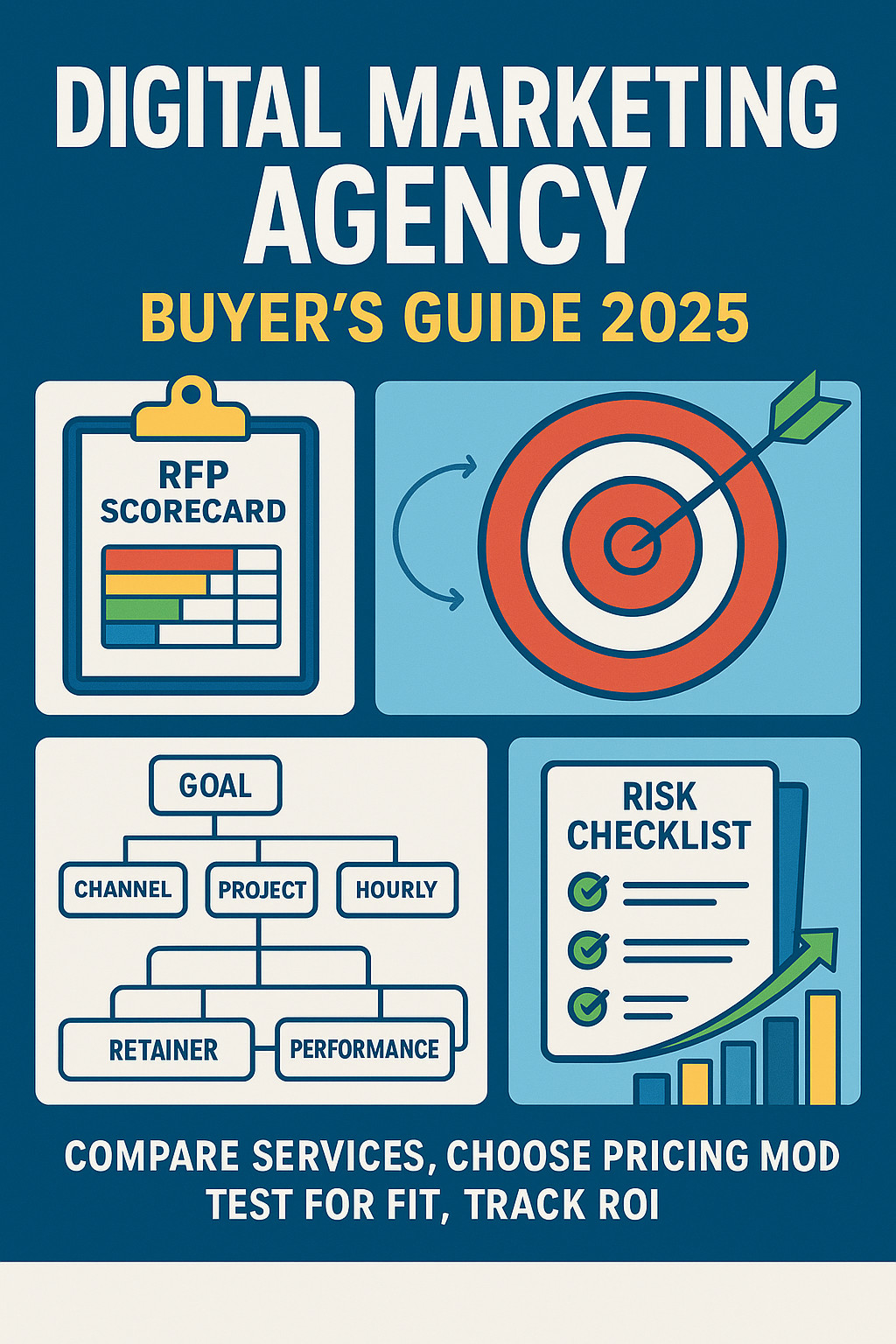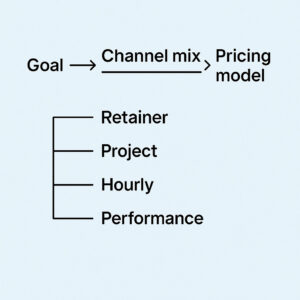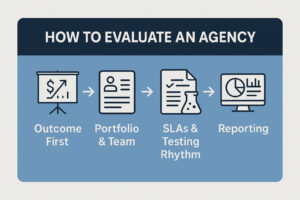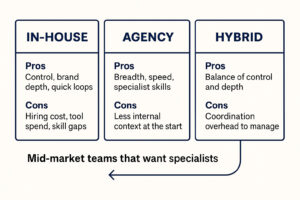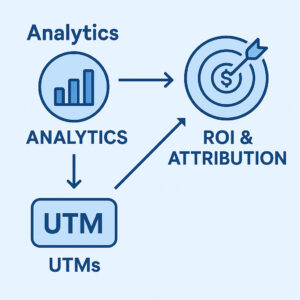You want a digital marketing agency that drives growth, not busywork. This guide shows you how to compare services, choose the right pricing model, test for fit, and track real ROI. You’ll also get an RFP scorecard, a simple attribution setup, and a clean checklist to avoid risk. By the end, you’ll feel ready to hire a digital marketing agency with confidence in 2025.
What a digital marketing agency does (services, KPIs)
A digital marketing agency is your growth team on demand. It blends strategy, creative, media, and data to turn attention into revenue. The work starts with goals, then breaks into channel plans for SEO, PPC, paid social, content, email/CRM, and CRO. Each channel gets a KPI target and a weekly testing rhythm. When an experiment hits, the team scales it. When it misses, the team learns and moves on. That steady cycle keeps you pointed at the numbers that matter: pipeline and sales.
A solid scope for a digital marketing agency covers three layers. First, a clear plan with quarterly goals and a 90-day roadmap. Second, fast execution on ads, landing pages, copy, and creative. Third, measurement that ties spend to revenue. Agencies that win tend to ship every week, document every change, and share dashboards you can trust. If you can read the score and you can see the tests, you can steer the program with ease.
Core services & KPI targets
| Service | What it does | Primary KPI | Good First Targets |
|---|---|---|---|
| SEO | Earns non-paid traffic from search | Non-branded clicks | +30% in 6 months |
| PPC (Google/Microsoft) | Buys high-intent clicks fast | CPA / ROAS | CPA at goal / ROAS ≥ 3x |
| Paid Social | Builds reach and demand | CTR / CPL | CTR ≥ 1.5% / CPL ↓ 20% |
| Content | Wins rankings and trust | Pages in Top 10 | +10 pages in 90 days |
| Email/CRM | Nurtures and repeats | Revenue per send | +15% in 90 days |
| CRO | Lifts on-site conversions | Conversion rate | +20% in 120 days |
| Analytics | Proves impact end-to-end | Pipeline & revenue | Weekly reporting cadence |
If you want deeper looks at scope and outputs, these Nesace posts help:
- Full-service marketing explained: https://nesacemedia.com/full-service-marketing-explained-for-growing-brands/
- Master marketing analytics: https://nesacemedia.com/master-marketing-analytics-for-business-growth/
- 9 channels to prioritize in 2025: https://nesacemedia.com/9-digital-marketing-channels-to-prioritize-in-2025/
You’ll notice the phrase digital marketing agency repeated across this page. That mirrors how buyers search and helps you find this guide when you need it.
Pricing models & what affects cost (retainer, project, performance)
The right pricing model for a digital marketing agency depends on your goals, speed, and risk tolerance. Four common models show up in proposals. Each can work well when scope and reporting stay tight.
A retainer fits ongoing growth. You get a stable team and a steady cadence. A project bid fits one-time builds, like a site overhaul, analytics migration, or a focused CRO sprint. Hourly works for short bursts or audits. Performance pricing ties fees to outcomes and needs clean attribution plus strong trust on both sides.
Pricing models explained
| Model | Best for | How billing works | Watch-outs |
|---|---|---|---|
| Monthly retainer | Ongoing growth with steady scope | Fixed monthly fee for a set mix of services | Scope creep without a backlog |
| Project-based | One-time builds with clear milestones | Flat bid tied to deliverables and dates | Post-launch support gaps |
| Hourly | Short, defined tasks | Pay for time used at set rates | Totals can swing without caps |
| Performance | Shared upside on leads or sales | Fee tied to CPA/ROAS or revenue share | Needs strong attribution and trust |
Several factors shift price. Complex industries cost more to research. Heavy creative needs lift hours. Fast timelines add rush fees. Extra legal review stretches cycles. Data setup (GA4, CRM, offline conversion imports) adds up-front work but pays off in cleaner reports. To see cost context and scope ideas, browse Nesace’s hubs:
- PPC: https://nesacemedia.com/pay-per-click-advertising/
- SEO: https://nesacemedia.com/seo-services-to-grow-your-business-and-increase-visibility/
- “Near me” buyer help: https://nesacemedia.com/top-digital-marketing-agency-near-me-how-to-choose-the-best/ and https://nesacemedia.com/how-to-find-the-best-marketing-agency-near-me-for-success/
Simple diagram
Goal → Channel mix → Scope → Pricing model
├─ Retainer
├─ Project
├─ Hourly
└─ Performance
How to evaluate an agency (portfolio, SLAs, reporting)
Start with the outcome you want. A digital marketing agency should show wins that match your goal and your stage. Ask for a short story: the problem, the tests they ran, and the numbers that moved. Look for channel breadth and senior oversight. Meet the actual team you’ll get. Confirm the weekly workflow: standups, sprint reviews, and QA steps. Read a sample report. If the deck is all vanity stats, keep searching.
SLAs matter more than most people think. A good digital marketing agency sets response times by issue type and blocks time for weekly testing. You also want a shared backlog so scope is never vague. That backlog keeps retainer work clean and makes project bids easy to price.
Reporting must be simple and useful. Expect a single dashboard that shows spend, traffic, conversions, pipeline, and revenue, plus notes on each test. When a test moves the needle, you should see it in the chart and in the plan for next week. If it’s hard to read, it won’t get used.
If you need a place to start, these reads help frame the decision:
- How to choose the best digital marketing agency in 2025: https://nesacemedia.com/how-to-choose-the-best-digital-marketing-agency-in-2025/
- Choose the right digital marketing agency for you: https://nesacemedia.com/choose-the-right-digital-marketing-agency-for-you/
In-house vs. agency vs. hybrid (pros/cons)
This choice isn’t binary. It’s a mix. In-house gives you control and instant context. A digital marketing agency adds speed, senior talent, and depth on niche skills. Hybrid blends both. Many brands keep strategy, brand voice, and core content inside. They use an outside digital marketing agency for PPC, SEO, analytics, CRO, and creative sprints. That model scales well because you can dial in talent as your plan shifts.
| Option | Pros | Cons | Best fit |
|---|---|---|---|
| In-house | Control, brand depth, quick loops | Hiring cost, tool spend, skill gaps | Mature programs with steady scope |
| Agency | Breadth, speed, specialist skills | Less internal context at the start | Fast scale and frequent tests |
| Hybrid | Balance of control and depth | Coordination overhead to manage | Mid-market teams that want specialists |
If you work in Oregon and want a local angle, this guide helps: https://nesacemedia.com/digital-marketing-agency-oregon-how-to-choose-wisely/
ROI forecasting & attribution setup (analytics stack, UTMs)
You can’t manage what you can’t measure. A strong digital marketing agency will forecast expected returns, set test budgets, and wire up tracking before the first dollar goes live. Start by capturing a baseline: traffic, conversion rate, average order value, sales cycle length, and lifetime value. Use those numbers to set targets for CPA and ROAS. Build a 90-day test plan that lists channels, creative variants, and landing pages.
Every link in the wild needs UTMs. Keep names short and consistent. Map web leads to the CRM. Import offline conversions so your ad platforms can learn from wins, not just clicks. Share one dashboard that blends ad data, site data, and CRM data. Then meet weekly to keep the loop tight.
Here’s a simple UTM “starter” you can paste into a sheet:
url,utm_source,utm_medium,utm_campaign,utm_term,utm_content
https://example.com,google,cpc,spring_sale_shoes,buy+running+shoes,ad1_lpA
If you want official how-tos, these two support docs help:
- Google’s UTM builder overview: https://support.google.com/analytics/answer/1033863
- GA4 conversion and attribution basics: https://support.google.com/analytics/answer/1008015
Analytics stack quick start
GA4 tracks site events. Google Ads and Microsoft Ads handle PPC. Meta, LinkedIn, and TikTok handle paid social. Looker Studio blends reports. HubSpot or Salesforce captures pipeline and revenue. A digital marketing agency should set this stack, document it, and keep it maintained.
Red flags and risk checklist
Some proposals look shiny on the surface but hide issues underneath. Avoid any digital marketing agency that refuses revenue tracking or pushes 12-month lock-ins with fuzzy scope. Skip teams that show only impressions and likes. Ask how they test landing pages and creative. If you hear “we’ll figure it out later,” that’s a warning. You also want a QA checklist for tags, pixels, and form tracking. Missed tracking is lost data, and lost data leads to bad calls.
A good digital marketing agency makes risk visible. You should see the backlog, the sprint plan, the change log, and the QA steps. You should see who does what and when. If you can’t see it, it probably isn’t happening.
RFP template + scorecard
When you like a few contenders, send a short RFP to get apples-to-apples proposals. Keep it simple. Describe your product and ICP, your goals, current channels, and tech stack. Share baseline numbers. Set target timelines. Ask for a 90-day plan and the reporting cadence. Request a sample report and an example dashboard. With clean inputs, each digital marketing agency can scope with care.
Agency RFP scorecard (Table 3)
| Criterion | Weight | Agency A | Agency B | Agency C |
|---|---|---|---|---|
| Strategy quality | 20% | |||
| KPI alignment | 15% | |||
| Team seniority | 15% | |||
| Measurement plan | 15% | |||
| Creative + CRO plan | 10% | |||
| Timeline & SLA | 10% | |||
| Case studies | 10% | |||
| Price/value | 5% |
CSV version (copy to Google Sheets or your CRM)
Criterion,Weight,Agency A,Agency B,Agency C
Strategy quality,0.20,,,
KPI alignment,0.15,,,
Team seniority,0.15,,,
Measurement plan,0.15,,,
Creative + CRO plan,0.10,,,
Timeline & SLA,0.10,,,
Case studies,0.10,,,
Price/value,0.05,,,
Primary CTA: Download the Agency RFP Scorecard (email gate).
Secondary CTA: Book a 30-min strategy call to review your scope together.
Contact link: https://nesacemedia.com/contact-us
FAQs
What does a digital marketing agency include?
Strategy, SEO, PPC, paid social, content, email/CRM, CRO, and analytics. Many digital marketing agency teams also run web and dev sprints as needed. For scope help, see: https://nesacemedia.com/full-service-marketing-explained-for-growing-brands/
How much does a digital marketing agency cost per month?
A focused retainer can start near $2k–$5k. A broad, multi-channel program with creative, CRO, and analytics can reach $15k–$50k+. Always ask for a clear roadmap and a backlog so time goes to the right work.
What questions should I ask before hiring?
Start here:
- How will you tie results to revenue?
- What is the 90-day plan?
- Who is on my account and how senior are they?
- How will you handle landing pages and creative testing?
- What does your QA checklist include for UTMs, GA4, and CRM?
For a longer pre-hire list, try: https://nesacemedia.com/how-to-choose-the-best-digital-marketing-agency-in-2025/
2 short case studies (anonymized KPI deltas)
B2B SaaS (mid-market). After hiring a new digital marketing agency, the team unified GA4 with HubSpot, rebuilt search structure, and ran three CRO tests across top pages. In four months, SQLs rose 58% quarter-over-quarter, CAC fell 24%, and blended ROAS hit 3.8x. The client kept the test cadence and expanded budgets.
Ecommerce apparel. The brand added Performance Max, refreshed creative on a monthly cycle, and cleaned the product feed. Over a year, revenue rose 72%, MER held near 3.1, and repeat purchase rate grew 11%. A small lift in AOV came from clearer bundles on mobile.
Methodology (how we run audits and reporting cadence)
Our digital marketing agency audit covers tracking, UTMs, and tag health first. Then we check channel setups, keyword themes, ad strength, and exclusions. We review landing pages for speed, clarity, and message match. We scan technical SEO and content gaps. We map CRM fields so pipeline data flows back to ad platforms. The result is a short list of high-impact tests and fixes you can make in the first 30 days.
We keep a steady rhythm. Weekly standups share wins, blockers, and next steps. Bi-weekly sprint reviews recap tests shipped and tests queued. The monthly QBR walks through KPI deltas in one Looker Studio deck, plus the 30-day plan. That steady cadence makes the entire digital marketing agency program easy to steer.
“Fast tests with tight measurement win. Focus on revenue KPIs, not vanity stats.” — Titonian Wallace Sr., Owner, Nesace Media.
KPI dashboard mockup (quick view)
A dashboard should answer two simple questions: “What moved?” and “What will we try next?” Ask your digital marketing agency for a board that tracks spend, sessions, CVR, CPA, ROAS, pipeline, and revenue, with notes on each test. Here’s a text-only mockup you can copy into your doc while the real board gets built.
Projected ROAS by Channel (Mock)
Search | ████████████ 3.6x
Paid Social| ████████ 2.4x
Display | █████ 1.8x
Email/CRM | ███████████████ 4.2x
SEO (LTV) | █████████████ 3.9x
Projected CPA by Channel (Mock)
Search | ███████ $120
Paid Social| █████ $95
Display | █████████ $150
Email/CRM | ███ $45
SEO (LTV) | ████ $70
Key Takeaways
Choose smart. Track tight. Iterate fast. The right digital marketing agency will show clear plans, ship tests each week, and tie every result to revenue. Pick a pricing model that fits your stage, use UTMs and GA4 with your CRM, and score proposals with the RFP sheet. Watch for vague scope and vanity reporting. If you can read the score and see the tests, you can scale.
Conclusion: Choose a partner who owns outcomes
The best digital marketing agency feels like an extension of your team. You see the plan. You see the tests. You see the results in your CRM. If you’re ready to scope, we can help draft your plan and build your shortlist.
Primary CTA: Download the Agency RFP Scorecard (email gate)
Secondary CTA: Book a 30-min strategy call
https://nesacemedia.com/contact-us
Additional Resources
- Master marketing analytics for business growth: https://nesacemedia.com/master-marketing-analytics-for-business-growth/
- Choose the right digital marketing agency for you: https://nesacemedia.com/choose-the-right-digital-marketing-agency-for-you/
- SEO vs. PPC: which strategy grows your business faster?: https://nesacemedia.com/seo-vs-ppc-which-strategy-grows-your-business-faster/
Author Bio
Titonian Wallace Sr. is the owner of Nesace Media and a senior digital marketing agency strategist with 15+ years across PPC, SEO, CRO, and analytics. He has led growth programs for B2B and e-commerce brands across North America. His approach is simple: ship weekly, measure well, and keep reports easy to read.

